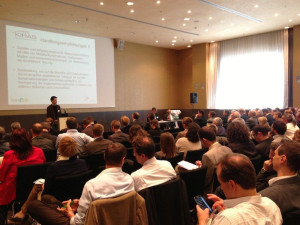Today, Stefan presented the results of our KIRAS project “Data Security Monitoring in Austria” at the third KIRAS symposium in Vienna. Click here to download the presentation slides.
Category Archives: Political Science
Online Voting Tools – Answer Profile Analysis in the Context of wahlkabine.at and the European Parliament Election 2009
Online voting tools enable us to compare our own political position with those of electable political parties in the context of a specific election. The Austrian online voting tool Wahlkabine.at uses a questionnaire of 25 to 26 questions, the users’ and the parties’ answer profiles to determine the political position of its users. In Austria we are still faced with a situation where the typical Internet user is more likely educated and young than formally uneducated and old. Anthony Down’s Economic Theory of Democracy understands politics as a market. Political parties offer manifestos that are requested by the voters. Parties act rational with maintenance of power and vote-maximization as their ultimate goals. The specific concept of Wahlkabine, the social inhomogeneity of the Austrian Internet users, and the assumption of rational acting and vote-maximizing parties leads to the following thesis: “Political parties optimize their Wahlkabine-answer-profiles differing from their political positions communicated in the general election campaign to maximize their votes among Wahlkabine users’. The corresponding research question is: “How do the Wahlkabine-answer-profiles of the Austrian political parties differ from their political positions communicated in the general election campaign in the context of the European Parliament election (4th to 7th June 2009)?”. The analysis has shown that only 9% of the analyzed positions differ from the Wahlkabine-answer-profiles. In total the analysis covers 84 sources consisting of manifestos (8), print media (50), online media (18), and TV shows (8). The detailed political position deviations are: ÖVP 11%, SPÖ 9%, Liste Martin 11%, FPÖ 6%, Grüne 0%, BZÖ 24%, JuLis 0%, KPÖ 0%. Due to these results we have to reject the thesis of this work. In the context of the European Parliament elections 2009 Austrian political parties consistently argued in the general election campaign and the Wahlkabine-answer-profiles. In the microscopic context of this work it was not possible to confirm the Economic Theory of Democracy. Online voting tools such as Wahlkabine enable their users to compare their political positions with those of the political parties. Furthermore, voters are enabled to easily compare even those political positions which are not in the focus of mass media to subsequently incorporate the gained knowledge into their voting decision process. The future and further related research will show how political parties deal with the increasing popularity of online voting tools.

